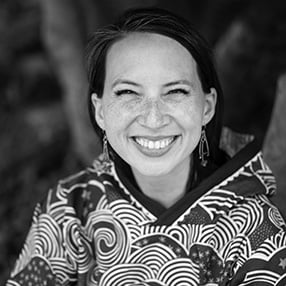Lodestone
my grippy socks are outside while inside
the grey tube magnets orbit my head,
the way I imagine seabirds circle a whale’s
bubble net. A technician charts my mind’s
grey furrows and I wander from my body.
Is this how god would judge me: counting
to see how long it takes my atoms to diverge
then align with his magnetic field? Even
with the machine’s exacting resolution, I don’t believe
he’d see me. Better to remember watching humpbacks
navigate and imagine how enskulled magnetite pulls
them along earth’s magnetic field. Is it that I wanted
the leviathan to see me, and perhaps god—the way I
once saw a whale in Resurrection Bay? We were bound
by the light wave reflecting off us, buoyed by oscillating
waves. Perhaps, there’d only be waves. I don’t need
to be seen, but I need the whale, the waves, the certainty
that we exist. Better to remember how I loved
the corded phone as a teen, loved its tight coils, more elastic
than they looked. I’d thread my finger through them,
like stacked rings and bind myself to another’s voice,
the limits of my romance. I didn’t know a compass
could encircle desire until my love replaced the cords
with a single shining loop. This machine demands removal.
Bereft, I remember how I lost myself following raspberries
through the woods behind our home. I could not find my way.
I called and his voice found mine before we saw each other.
I called and his voice found me.
Copyright © 2025 by Annie Wenstrup. Originally published in Poem-a-Day on November 19, 2025, by the Academy of American Poets.
“I wrote ‘Lodestone’ during a time of uncertainty. Relatedly, I was obsessed with the principles of navigation, especially how to move through what can’t be seen. The idea of sounding out the world—not unlike how my then-kindergartner learned to sound out language—offered an alternative route to understanding how I was oriented to place. It also offered clarity to a different soundness, to being part of the more than human world, and to receiving my husband’s love. I’m grateful that [that] season of physical precarity and its lessons has passed, and I’m grateful for the contours it revealed.”
—Annie Wenstrup

